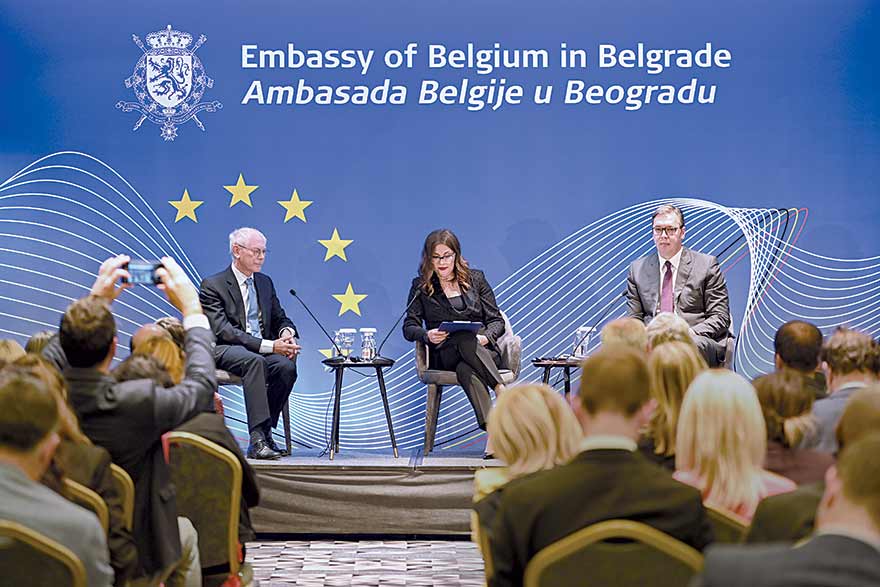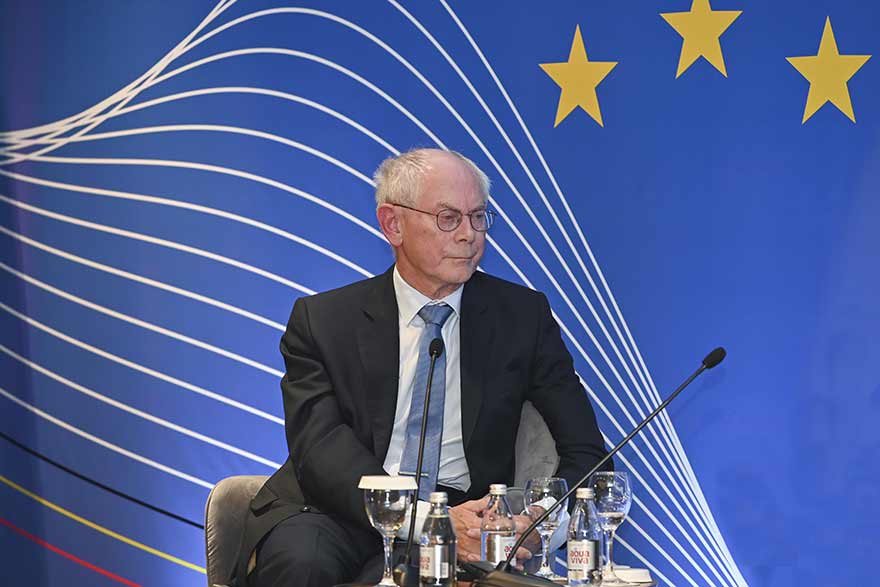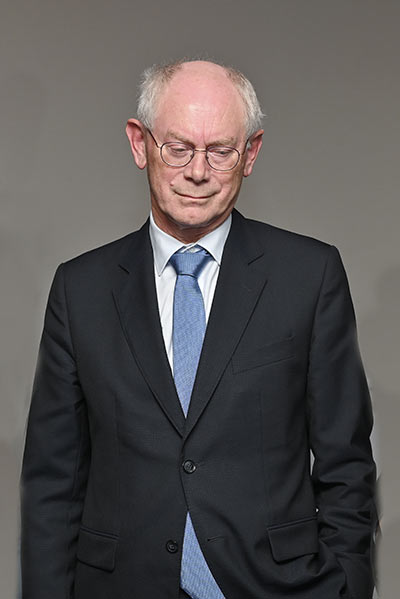The latest (European Council) decision on North Macedonia and Albania reflects some concerns about the readiness of the EU itself to welcome new members at this juncture but does not at all raise doubts about the principle of the European perspective of these countries itself – Herman Van Rompuy
Just a few days after Herman Van Rompuy visited Belgrade and said the lever for the region’s prosperity shouldn’t be sought in Moscow, Ankara or Beijing, but rather in Brussels, his successors at the helm of the European Union didn’t agree for North Macedonia and Albania to open accession talks. In this interview for CorD Magazine, the President Emeritus of the European Council and the former Prime Minister of Belgium analyses the reasons for the lack of support for enlargement but adds that he is convinced that the current situation shouldn’t be interpreted as closing the door to the countries of the Western Balkans.
Quoting Nobel laureate Ivo Andrić, Van Rompuy notes that he sees Serbia as a key country in the region that could contribute to strengthening Europe by engaging in bridging the differences between the peoples of the region, fostering reconciliation and building on each other’s strengths to promote the well-being of all.
Advocates for the EU integration of the Western Balkans are disappointed with the decision of European leaders to postpone the opening of membership talks with North Macedonia and Albania. Many believe that this initiative serves to undermine the EU’s credibility in the region. How do you view this stance of the European Council? Do you believe that the EU enlargement process will continue in the near future?
It is obvious that the European Council’s decision about the postponement of the start of accession negotiations with Albania and North Macedonia is felt like a cold shower in the Balkan countries. I do not hide my personal conviction that this is a missed opportunity: we could have shown the region that we appreciate the efforts made towards the peaceful settlement of bilateral disputes and towards the equally important internal reform process that will qualify the countries of the Western Balkans to become EU member states in the not-so-distant future. But the region shouldn’t despair.

The (European council) decision reflects some concerns about the readiness of the EU itself to welcome new members at this juncture but does not at all bring into doubt the principle of the European perspective of these countries itself. It is a pity that Europe was not able to give the encouraging political signal today. Still, in the medium and long term it is probably beneficial for all the peoples involved that we have a careful look at how the accession negotiation process can actually better deliver on its promise to bolster transformational forces in society and governance, prior to enlargement.
You said while in Belgrade that the key to prosperity isn’t to be found in Beijing, Moscow or Ankara, but rather in Brussels. Do you agree with the assessment that postponing EU enlargement inevitably prompts countries like Serbia to turn towards new partnerships beyond the EU?
There is nothing wrong with building partnerships outside the EU. We have seen before how special relationships, often built for historical reasons between member states and the world outside Europe, has contributed to strengthening the Union’s capacity to deal with this world. Looking at the Balkans, there is, however, one major difference: geography makes the European destiny of this region inevitable; you are already surrounded by EU member states, the bulk of your trade is with the EU, which is also the source of the majority of the foreign direct investments in your countries. It would be a historic mistake by the leaders of this region to turn their back on the EU and look elsewhere for greener pastures. At the end of the day, here and everywhere, political decision-makers should let their strategic decisions be guided by the interests of the citizens they represent.
Let’s not forget the European Council decision was taken at the same meeting during which the European leaders had to decide about future steps regarding Brexit. So, yes, it is obvious that Europe is struggling with internal problems that shift attention away from other issues, including enlargement
There is, in my view, not the slightest doubt that the security, political, social and economic interests of the countries of this region continue to be better served by the European integration path. I do admit that this will require patience and some political will and courage, especially these days, but difficult times always give an opportunity to show real statesmanship.
In evaluating the current situation, do you consider that the obstacles to the swift EU integration of the Western Balkans are greater within the region or within the EU?
Let’s not forget the European Council decision was taken at the same meeting during which the European leaders had to decide about future steps regarding Brexit. So, yes, it is obvious that Europe is struggling with internal problems that shift attention away from other issues, including enlargement.
The obstacles in the accession countries are also indirectly, or for some leaders directly, related to internal European problems, with respect to the way some member states deal with fundamental issues of the rule of law, democratic governance and media freedom. There is a fear in many countries in the EU that the European construction, based on a fundamental respect for these core democratic values, could be weakened from within or by admitting new member states that have not yet shown sufficient commitment to preserving this acquis in their own countries. So, we need time and political resolve to overcome obstacles both in the EU and in candidate countries.
A Belgian is again at the helm of the European Council, and also – like yourself – has experience as the prime minister of Belgium. What do you consider will be the biggest challenges facing the EU’s new leaders and European Council President-elect Charles Michel?
Every European President has one overwhelming, and indeed extremely challenging task: to retain unity among the members in one of the most daring experiments of supranational integration the world has ever seen. The readiness of the member states to pool part of their sovereignty to address problems and opportunities on a scale that goes beyond their countries’ borders requires permanent care, to make sure each and everyone’s interests are respected.

The Belgian coat of arms “L’Union fait la force” (Unity makes strength) applies to Europe as well: without unity among the member states, we cannot properly digest Brexit, we cannot build instruments that combine solidarity with a sense of responsibility in the economic and social field, nor can we play a significant role on the world stage, to tackle problems such as climate change or migration. If European leaders cannot ‘get their act together’ and show that they are collectively a force to be reckoned with, to meet these challenges, Europe risks becoming irrelevant and falling into the hands of populists and nationalist forces that may undermine the very essence of the European project.
Do you believe that the separation of the EU and the UK is imminent, and how do you see future relations between the Union and the UK?
These very days we are going through a process with an outcome that remains clouded by uncertainty. Whatever the result of the Brexit negotiations, there will always be the necessity to maintain a deep, multidimensional and intense relationship with a country that remains a direct neighbour of the EU, and with which we share the same values. One may argue that the same geographically reality that makes the European destiny of the Balkans unavoidable will also constitute the principal argument to make sure we maintain a close partnership with the UK in all areas of common interests.
The new Kosovo government has yet to be formed, and this will be an indispensable interlocutor for everyone who tries to break the present stalemate in the Belgrade-Pristina dialogue. It is positive to see more engagement from the international community, including the U.S., to contribute to this process
Speaking about Serbia, you noted that you see the country as a bridge between the eastern and western parts of Europe. Can you elaborate on what significance Serbia could have in that interconnection?
 The Bridge Over the Drina, by Yugoslav Nobel Prize Winner Ivo Andrić, in some way symbolises what I wanted to say: the Balkans, and Serbia in particular, has been the meeting point – unfortunately often accompanied with a lot of bloodsheds – between cultures and societies that together constitute Europe’s socio-cultural and religious heritage. Serbia is the most important country in the Western Balkans. It has a historic vocation in the region of reconciliation and progress. Bridging the differences between the peoples of the region, fostering reconciliation and building on each other’s strengths to promote the well-being of all is what Europe is about.
The Bridge Over the Drina, by Yugoslav Nobel Prize Winner Ivo Andrić, in some way symbolises what I wanted to say: the Balkans, and Serbia in particular, has been the meeting point – unfortunately often accompanied with a lot of bloodsheds – between cultures and societies that together constitute Europe’s socio-cultural and religious heritage. Serbia is the most important country in the Western Balkans. It has a historic vocation in the region of reconciliation and progress. Bridging the differences between the peoples of the region, fostering reconciliation and building on each other’s strengths to promote the well-being of all is what Europe is about.
This is indeed also our Belgian experience and could become Serbia’s contribution to strengthening Europe, as the pivotal country in the Western Balkans. Serbia, moreover, lies on the interconnectivity crossroads between northern and southern Europe, in terms of communication and transport infrastructure.
Individual analysts of relations within the EU talk about the growing differences between Europe’s East and West, which are expressed in relations towards the migrant crisis, the degree of affirmation of the rule of law, in relations with Russia, China and third countries, but also in relations regarding the EU’s further enlargement. Do you think this is linked to serious stratification within the EU?
The Central and Eastern EU are not homogeneous. The concept of ‘new member states’ is not homogeneous either, as the Baltic States form a separate group in many respects. There is no reason why the EU’s ‘Mittel Europe’ should be doomed to be less democratic than others. It simply depends on the government that each country has. The situation was very different a few years ago. A government is not a regime – governments come and go.
Every European President has one overwhelming, and indeed extremely challenging, task: to retain unity among the members in one of the most daring experiments of supranational integration the world has ever seen
You consider that it is the EU that can contribute to creating an atmosphere of trust that would ease the dialogue between Belgrade and Pristina. Do you have the impression that current events – such as the appointment of two U.S. envoys to the region – suggest the conclusion that this crisis on European soil will also be resolved by another factor – America or several of the most influential EU member states – without the reaching of a consensus within the Union?
I would like to plead for a little patience. European elections took place only a couple of months ago, and the EU Commission is being formed and will only take office in the coming weeks. The new High Representative for Foreign Affairs and Security Policy, Mr Borrell, has already indicated that Pristina will be his first destination. The new Kosovo government has yet to be formed, and this will be an indispensable interlocutor for everyone who tries to break the present stalemate in the Belgrade-Pristina dialogue.
It is positive to see more engagement from the international community, including the U.S., to contribute to this process. Bigger EU member states, such as France and Germany, have also indicated their willingness to step up their efforts. Still, I believe it would ultimately be logical for the initiative to remain in the hands of High Representative Borrell. Europe has to show that it can deal with the security and stability challenges in its immediate neighbourhood.
| COLD SHOWER
The decision to postpone the start of accession negotiations with Albania and North Macedonia is felt like a cold shower in the Balkan countries |
PASTURES
It would be a historic mistake by the leaders of this region to turn their back on the EU and look elsewhere for greener pastures |
CHALLENGES
Europe has to show that it can deal with security and stability challenges in its immediate neighbourhood |
|---|